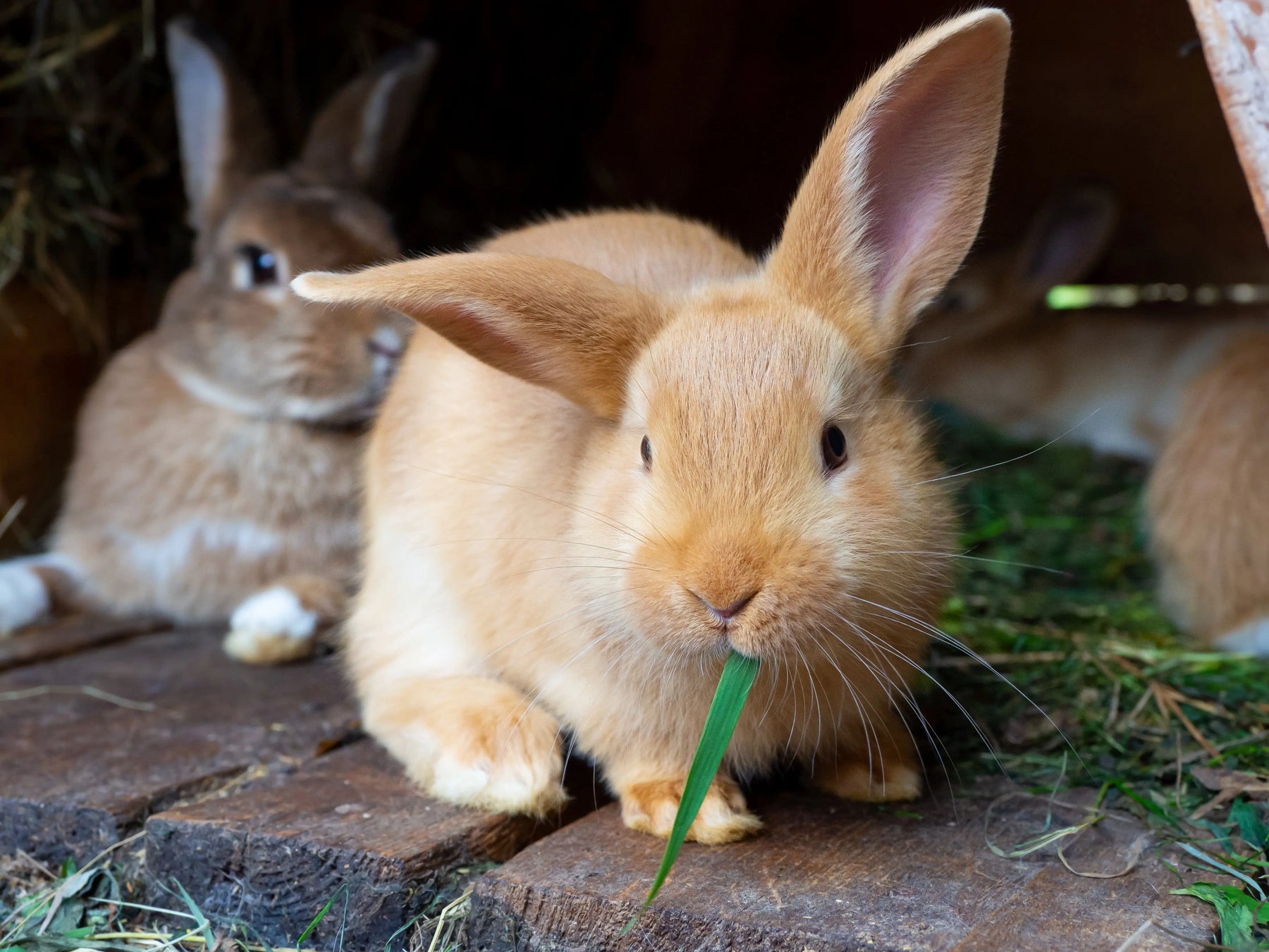From £6.99

Demystifying Rabbit Diet: What Exactly to Feed Your Furry Friend?
When it comes to caring for a pet rabbit, one of the most important aspects to consider is their diet. Providing the right kind of food is essential for keeping your furry friend healthy and happy. But with so many options available, it can be confusing to know exactly what to feed a rabbit. In this blog post, we will explore the foundations of a rabbit's diet, the role of vegetables and fruit, the truth about commercial rabbit food, foods to avoid, and some helpful tips for feeding your rabbit.
The Foundations of a Rabbit's Diet
At the heart of every rabbit's diet lies a combination of hay, fresh vegetables, a sparing amount of fruit, and a selective use of commercial rabbit pellets. Predominantly, hay should form the bulk of their intake (approximately 85%), serving not only as a critical fibre source that aids in digestion but also as a natural means to facilitate dental health, by ensuring the continual wear of their ever-growing teeth. The emphasis on hay cannot be overstated; it's indispensable for its role in maintaining a healthy gut and preventing obesity.
Vegetables are the next pillar in constructing a balanced diet for your furry companion, providing them with necessary vitamins and minerals that are not sufficiently covered by hay alone. However, it's paramount to remember that not all vegetables are created equal in the eyes of a rabbit. Leafy greens should dominate this part of their diet, supplemented by a variety of other vegetables to keep meals interesting and nutritionally complete.
Fruit, while a delightful treat, should be given with restraint. Owing to their high sugar content, fruit is best reserved for occasional indulgences rather than a staple. As for commercial rabbit pellets, they should be viewed as a supplement to the diet rather than its cornerstone. Opting for a high-quality, fibre-rich pellet will ensure that your rabbit receives all the necessary nutrients without the risk of over-reliance on processed food, which often lacks the complexity of nutrients found in fresh produce and hay. In orchestrating these components thoughtfully, one can craft a diet that is both nourishing and enjoyable for their rabbit.
The Role of Vegetables in a Rabbit's Diet
Vegetables are indispensable in enriching a rabbit's diet with vital nutrients, playing an instrumental role in their overall health. A diverse array of vegetables, particularly leafy greens, should be integrated into their daily meals. Varieties such as kale, romaine lettuce, and bok choy are excellent choices, offering a wealth of vitamins and minerals. Alongside these, introducing a mix of other vegetables like carrots (sparingly due to their sugar content), bell peppers, and broccoli can enhance the nutritional value of their diet, providing a broad spectrum of dietary benefits.
Incorporating vegetables not only ensures a balanced intake of essential nutrients but also adds variety to the rabbit's meals, making their eating experience more enjoyable. It's crucial, however, to proceed with caution when introducing new vegetables. A gradual approach is advised to safeguard against potential digestive disturbances. Each new vegetable should be given in small quantities initially, observing the rabbit's response to ensure they do not exhibit signs of gastrointestinal discomfort.
Furthermore, the cleanliness of vegetables is paramount to prevent the ingestion of harmful chemicals or dirt. Thorough washing under running water is recommended before offering them to your rabbit. This practice helps to minimise the risk of exposing your pet to pesticides, which can be detrimental to their health.
Integrating vegetables into your rabbit's diet is not merely about providing them with food but ensuring they receive a well-rounded diet that supports their well-being. By thoughtfully selecting and preparing vegetables, you contribute significantly to sustaining your rabbit's health and vitality.
Understanding the Place of Fruit in Their Diet
Fruit, when introduced to a rabbit's diet, should be viewed as a luxurious treat rather than a dietary necessity. This is because fruits, albeit natural and seemingly healthy, contain higher levels of sugar compared to the vegetables and hay that should constitute the majority of their diet. Rabbits, by nature, have a sweet tooth and will readily indulge in fruits given the opportunity. However, the high sugar content in fruits such as strawberries, blueberries, and melon can lead to an array of health issues, including obesity and dental problems, if consumed in large quantities.
To incorporate fruit responsibly into your rabbit's diet, moderation is key. Offering small pieces of fruit as an occasional treat can enrich their diet without compromising their health. It is essential to limit these treats to a couple of times a week and in small portions to avoid any adverse effects. Additionally, certain fruits should be offered with caution; for example, apple seeds must be removed due to their toxic properties, and overly ripe or wilted fruit should be avoided to prevent digestive issues.
When selecting fruits as treats, it's also advisable to choose those with lower sugar content and higher fibre, ensuring you are still promoting good health while offering a varied diet. It's this careful balance and mindful approach to incorporating fruits that can enhance your rabbit's dietary experience, providing them with enjoyable flavours and textures without undermining their nutritional needs.
The Truth About Commercial Rabbit Food
Commercial rabbit pellets are formulated to supplement a rabbit’s diet, providing essential nutrients that may not be adequately supplied by hay and fresh produce alone. These pellets are a concentrated source of vitamins, minerals, and fibre, aimed at complementing the nutritional needs of rabbits. However, it is crucial to exercise discretion in their use. Over-reliance on pellet-based feeds can detract from the consumption of hay, which is essential for both dental health and effective digestion in rabbits. Pellets should thus constitute only a minor component (approx. 5%) of the diet, with the emphasis firmly on a hay-rich (85%) intake, augmented by fresh vegetables (10%).
Selecting the right type of commercial rabbit food is equally important. Not all pellets are created equal; some may be laden with unnecessary additives, sugars, or fillers that do little to benefit your rabbit's health and may, in fact, be detrimental. Seek out brands that prioritise fibre content and eschew those that incorporate muesli-style mixtures, which can encourage selective feeding and result in nutritional imbalances.
Feeding guidelines provided by pellet manufacturers can offer a useful starting point, but these should be tailored to the specific needs of your rabbit, considering their age, size, and health. It's also advisable to engage with a veterinary professional or a rabbit nutrition expert to fine-tune your rabbit’s diet, ensuring they receive the right amount of pellets to support their health without compromising the intake of more crucial dietary components.
Foods to Avoid Feeding Your Rabbit
In ensuring the well-being of your rabbit, it is paramount to be aware of certain foods that pose health risks, potentially leading to serious complications. Notoriously, chocolate stands as a significant hazard, containing substances that rabbits cannot metabolise, which can lead to toxicity. Similarly, avocado is known for its persin content, harmful to rabbits and can cause cardiac distress. Onions, along with other members of the allium family such as garlic and leeks, should also be strictly off-limits, as they can induce blood disorders in rabbits.
Additionally, certain fruits such as grapes and raisins are detrimental to your rabbit’s health due to their high sugar and acidic content which can upset their digestive system. Uncooked beans and rhubarb, in particular, can cause severe illness and must always be avoided. It is also not recommended to feed muesli style mixes for rabbits as these have been known to cause fatal dental and digestive diseases. Although there are lots of this type of "rabbit" food on the market, Chestnut Mill do not sell them for this reason.
Processed foods, rich in sugars or salts, must be avoided to prevent obesity and related health issues. The inclusion of such foods in a rabbit's diet contradicts their need for a high-fibre, low-sugar diet and can disrupt their delicate digestive balance. Likewise, dairy products and meat are not suitable for these herbivores, as their digestive systems are not designed to process such items.
Equally, caution should be exercised with garden plants and houseplants, many of which can be toxic to rabbits. Before offering any part of a plant to your rabbit, thorough research or consultation with a vet is advised to ensure its safety. By steering clear of these hazardous foods and focusing on a diet rich in hay, vegetables, and a controlled amount of fruit and pellets, you can help maintain your rabbit’s health and well-being.
Tips for Feeding Your Rabbit
Ensuring your rabbit has access to clean drinking water is crucial. Gradually introduce new dietary elements to mitigate the risk of gastrointestinal upset. Regularly monitor your rabbit's weight to make dietary adjustments as necessary, catering to their health and nutritional needs. Incorporate a diverse range of vegetables into their diet to achieve a nutritional balance, providing them with an array of vitamins and minerals essential for their well-being. It’s advisable to consult a vet for tailored advice regarding your rabbit's diet, particularly if you observe any changes in their eating habits or general health. This proactive approach towards your rabbit's nutrition and health will help in maintaining their vitality and happiness.
